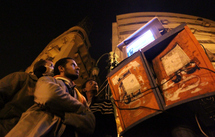The Al Jazeera Effect
HUGH MILES
The inside story of Egypt's TV wars and how Saudi Arabia could be next.

"We knew something was coming," Mustafa Souag, head of news at Al Jazeera's Arabic-language station, told me Monday. "Our main objective was to provide the most accurate and comprehensive coverage that we could by sending cameras and reporters to any place there is an event. And if you don't have a reporter, then you try to find alternative people who are willing to cooperate because they believe in what we are doing."
The Tunisian uprising revealed that the dogma perpetuated by the country's regime -- that it was impregnable and its security services invincible -- was merely propaganda aimed at keeping Tunisia's people subdued. Al Jazeera shared this revelation around the region live and in real time, breaking the spell that had stopped millions of ordinary people from rising up and claiming their legitimate rights. Suddenly change seemed possible everywhere across the Middle East.
"We did not foresee the drama of events, but we saw how events in Tunisia rippled out and we were mindful of the fact [that] things were changing, and so we prepared very carefully," said Al Anstey, managing director of Al Jazeera English. "We sent teams to join our Cairo bureau and made sure that we were covered on the ground in other countries in the region so when the story unfolded we were ready to cover all angles."
Al Jazeera's powerful images of angry crowds and bloody morgues undercut the Egyptian regime's self-serving arguments and stood in sharp contrast to the state-run TV channels, which promoted such a dishonest version of events that some of their journalists resigned in disgust. At least one popular TV talk-show presenter, Mahmoud Saad, was later seen being carried on the shoulders of triumphant demonstrators in Tahrir Square. While Al Jazeera was showing hundreds of thousands of people calling for the end of the regime, Egyptian TV showed humdrum scenes of traffic quietly passing by; when Al Jazeera reported hundreds of people queuing for bread and petrol, Egyptian TV showed happy shoppers with full fridges using footage filmed at an unknown time in the past.
During the uprising in Cairo, the Egyptian government systematically targeted Al Jazeera in an attempt to impede the network's gathering and broadcasting of news. On Jan. 27 Al Jazeera Mubasher, the network's live channel, was dropped by the government-run satellite transmission company, Nilesat. On Jan. 30, outgoing Egyptian Information Minister Anas al-Fiqi ordered the offices of all Al Jazeera bureaus in Egypt to be shut down and the accreditation of all network journalists to be revoked. At the height of the protests, Nilesat broke its contractual agreement with the network and stopped transmitting the signal of Al Jazeera's Arabic channel -- which meant viewers outside Egypt could only follow the channel on satellites not controlled by the Egyptian authorities. To the rescue came at least 10 other Arabic-language TV stations, which stepped in and offered to carry Al Jazeera's content. "They just volunteered," said Souag. "They were not paid, and we thanked them for that."
The next day, six Al Jazeera English journalists were briefly detained and then released, their camera equipment confiscated by the Egyptian military. On Feb. 3, two unnamed Al Jazeera English journalists were attacked by Mubarak supporters; three more were detained. On Feb. 4, Al Jazeera's Cairo office was stormed and vandalized by pro-Mubarak supporters. Equipment was set on fire and the Cairo bureau chief and an Al Jazeera correspondent were arrested. Two days later, the Egyptian military detained another correspondent, Ayman Mohyeldin; he was released after nine hours in custody. The Al Jazeera website has also been under relentless cyberattack since the onset of the uprising.
"The regime did everything they could to make things difficult for us, but they did not succeed," said Souag. "We still had the most comprehensive reporting of the events in Egypt."
After the first few days of the uprising, the Egyptian state media began running an insidious propaganda campaign in an apparent effort to terrorize ordinary Egyptians into staying at home and off the streets. Channel 1 on Egypt state TV issued vague yet alarming warnings about armed thugs trying to infiltrate the protests and later broadcast live phone-ins in which members of the public complained about looting and disorder. It's hard to think of a better way to incite panic in a jittery population, especially because there have been no emergency services in Egypt for days. By the time these garbled and unsubstantiated stories passed through the Egyptian rumor mill, ordinary people would be forgiven for thinking World War III had broken out. Egyptian state media have also issued warnings of international journalists with a "hidden agenda" and accused Al Jazeera of "inciting the people." One supposed "foreign agent" was shown on Egyptian state TV with face obscured, claiming that she had been trained by "Americans and Israelis" in Qatar, where Al Jazeera is based.
But the lid on Pandora's box has been prized open, and undemocratic regimes across the region are now looking over their shoulder at Al Jazeera -- for history shows that where Egypt goes, other Arab countries soon follow. Given Al Jazeera's enormous influence on the Arab street and its electrifying message that Arab dictatorships are, in fact, mortal, it is no wonder dictators and despots across the region have been left feeling rather rattled. There have already been hints of insurrection's ripples in Algeria, Jordan, Yemen, and Bahrain. But could Al Jazeera threaten Saudi Arabia?
----------------------
Foreign Policy